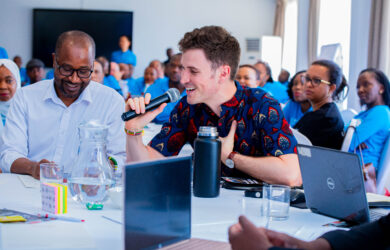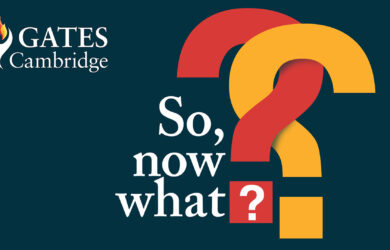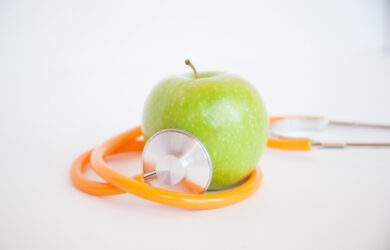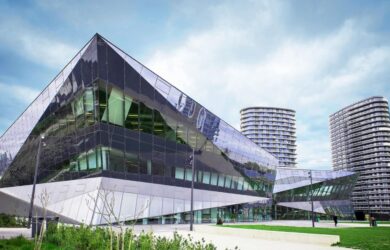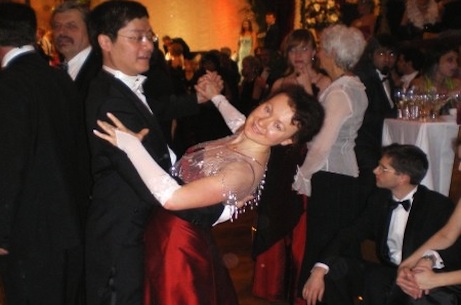
Gates Cambridge Alumna Oksana Trushkevych is currently studying the use of ultrasound to trace cracks in buildings and aircraft and the use of magnets in fridges in place of harmful gases.
Oksana Ruzak now Trushkevych [2001] was one of the very first Gates Cambridge Scholars and remembers well the atmosphere at the outset of the scholarship programme in 2001.
“It was an exciting time and we definitely all felt committed to the Gates vision from the start,” she says. “There were many meetings of scholars. We met Bill Gates senior and junior during a Chinese meal at the University Centre. We definitely felt like a body of scholars.”
Oksana had applied to and been accepted to do a PhD at Cambridge the year before, but because of cuts that year had not been able to secure the necessary funding. The Gates Cambridge Scholarship set her on a path which has led to research in the use of liquid crystals which could lead to better diagnostic equipment and just recently to the University of Warwick where she is a research fellow studying the use of ultrasound to trace cracks in buildings and aircraft and the use of magnets in fridges in place of harmful gases.
Oksana was born in Lviv in Ukraine. Both her parents are engineers and her mother also does tour guiding. She comes from an academic family. One great-grandmother was a gynaecologist and the first woman to go to university in the family. Another was an English teacher who taught Oksana English from an early age.Her grandfather was an academic specialising in electronics. His father was also an academic.
Oksana had broad interests at school, although maths was always one of her favourite subjects and she had a good teacher. She did extra physics because her father had a passion for it and tried to steer her in that direction. “He wanted me to be an engineer, but I took a physics degree because the teacher who gave me the extra classes explained it so well and gave me a love and passion for understanding how things work,” says Oksana.
In fact her main choice at university was between English and physics and maths. She decided to keep the English as an add-on and focus on physics. However, her English has proven important since it has given her access to the vast amount of research written in English.
Oksana went straight to Lviv National University after school. In the third, fourth and fifth years of her course she did different research projects. Her fifth-year project was on experimental physics and gave her a taste for research. It involved studying phase transitions of crystals by optical methods.
Cambridge
She applied to the University of Cambridge in her final year. “I never believed it would be possible to get to Cambridge, but a family friend got in to do a PhD so it gave me a bit of faith,” she says.
She applied in 2000 before she had her final results, but had to defer her place due to lack of funding and started her first year of a postgraduate degree in Ukraine.
As luck would have it, the following year was the inaugural year of the Gates Cambridge Scholarships. She was interviewed over the phone and was successful. Her PhD in Engineering, which she finished in 2005, was in part linked to her fourth year undergraduate project on liquid crystals.
“I was looking at the dynamic holography of liquid crystals, how if you add dyes and nanostructured carbon materials it makes the liquid crystals more sensitive to light,” says Oksana. “Being able to do holography with low light powers is useful for things like medical imaging. The ultimate aim is to form 3D images of things in real time with low power consumption which brings savings in production costs. This can be used to build up an image on a special screen so doctors can make better judgements. Visualisation is very important.”
In addition to her academic work, Oksana is a keen mountaineer, singer and ballroom dancer. She was also secretary and vice president of the Cambridge University Ukrainian Society for a long time, building on her activism in student organisations in Ukraine. The Society set up a series of lectures and was instrumental in creating a Ukrainian Studies Programme at Cambridge. “It was a social group, but it was also about trying to counter misunderstanding about Ukraine and to support the country’s development,” says Oksana.
Ultrasound
She stayed in Cambridge after completing her PhD and was offered a postdoctoral position at the then new Centre for Advanced Photonics and Electronics. She also became a fellow of Wolfson College.
For her postdoctoral studies she branched out into a slightly different area and worked on nanomaterials, focusing on the creation of optically sensitive nanocomposites with liquid crystals. She says the liquid crystal materials are also useful for areas such as security. “We showed that they have the potential to control radiation so that it doesn’t harm humans or equipment used to see hidden objects. This could be used in, for instance, customs screening or assessing burns in patients you cannot touch. It can show how much water the burns retain. There are many applications,” she says.
Last year she moved to the University of Warwick because her husband is also an academic and they needed to find a university where they could both work. She is again doing something slightly different. She says she hopes moving into different but linked areas will make her research more productive. At Warwick she is studying magnetic materials and one possible application is in magnetic refrigeration – that is looking at how magnets can do the job of the environmentally unfriendly gas currently used in fridges. The group she works in is also investigating how ultrasound can be used in engineering, for instance, to look at cracks in airplanes or large buildings. In addition to her research she is supervising the research projects of several undergraduate students.








